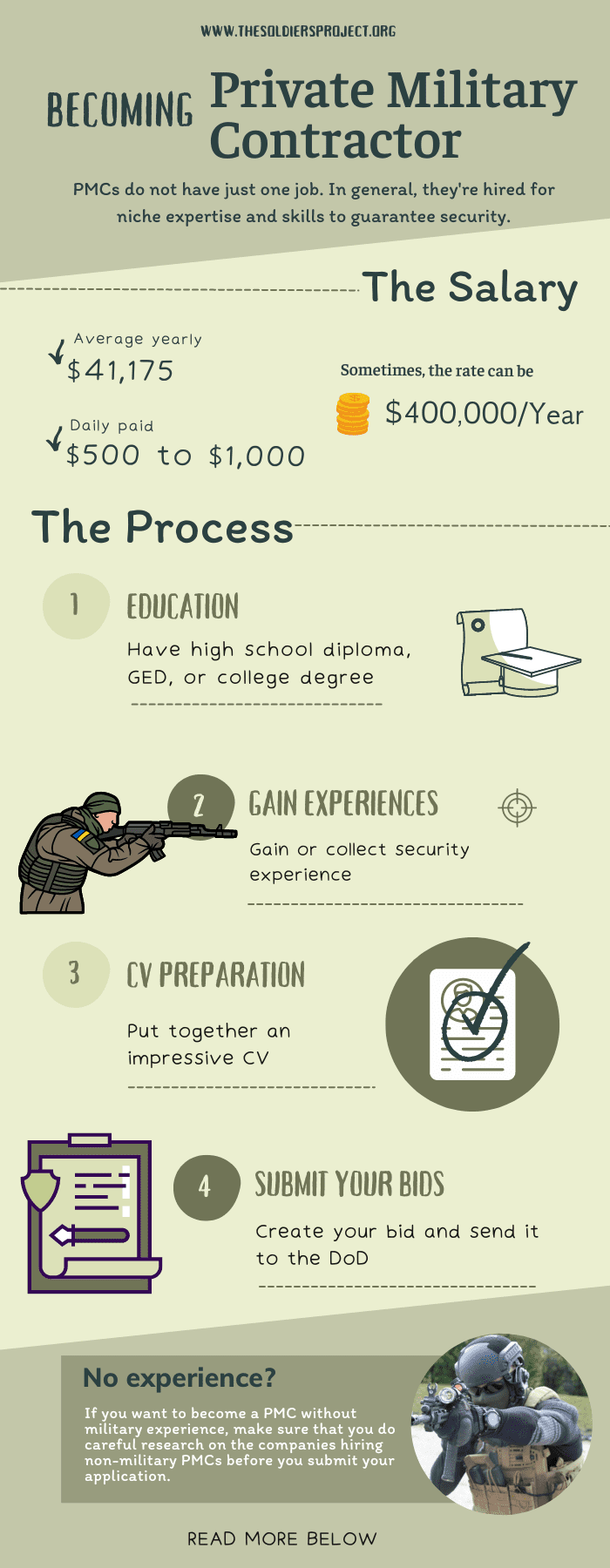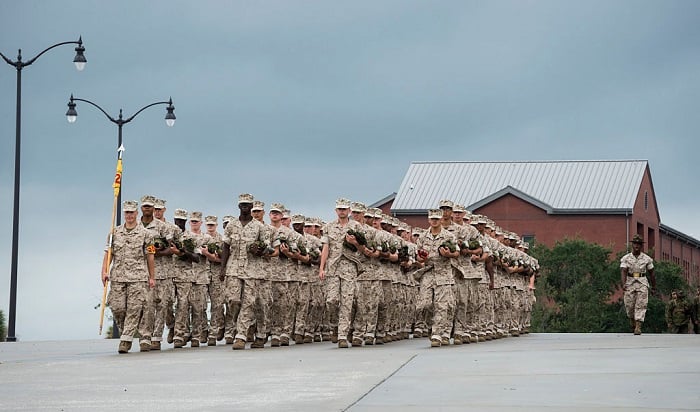If you want to work with the military, you may become a PMC, which is short for a private military contractor. As a private military contractor, you provide security services and/or armed combat that is similar but usually on a smaller scale than governmental or police forces.
PMCs in active combat zones are used around the world and will have varying duties depending on where they are hired. Many of today’s PMCs are ex-military personnel. They essentially fill in the organization’s gaps, whether that is playing defense or offense.
PMCs are also called “mercenaries”, though this name has a more negative reputation. It does not do justice to the good rapport and value of PMCs. Still, it is arguable that PMCs “profit off of endless wars”, which is, more or less, a bad thing.
Becoming a private military contractor is difficult but not impossible. With the help of our detailed guide here on how to become a private military contractor, you can go ahead and sign with the military yourself. The essential steps are:
- Have a high school diploma, GED, or college degree
- Gain or collect security experience
- By serving in a police department, government agency, or the military
- Put together an impressive CV to showcase yourself
- Create your bid and send it to the DoD as an application
You will learn more as you read. So, continue to read until the end!
Table of Contents
Private Military Contractor – An Overview
Before we jump into learning how to become a private military contractor, here is a section dedicated to other relevant essential information. This may help you decide if becoming a PMC is really the right decision.
What Do PMCs Do
PMCs do not have just one job. Their duties and tasks depend on a variety of other factors. Some examples of what PMCs do are:
- Conduct counter-drug operations
- Fight against terrorism
- Protect employees on oil rigs or fields
- Guard politicians or political dignitaries
- Train security personnel on site
- Assist the police or military personnel on assignments
- Guard government building and corporate headquarters
- Collaborate with special forces to conduct surveillance activities in war zones
- Provide armed escort for high-risk figures and diplomats
- Work with security professionals to map out safe routes and defensive processes
- Serving as an armed guard during military supply transportation across territories
In general, PMCs are hired for niche expertise and skills to guarantee security.
How Much Do PMCs Earn
Although there are no exact numbers because PMCs often do not disclose their salary, the national average expectation for similar occupations is $41,175 a year, compared to other private contractors with #32,480 a year and security officers $47,539 a year.
Some PMCs will be paid daily, ranging between $500 to $1,000, depending on who is hiring and what the PMC is hired for. Sometimes, the rate can go up to $400,000 per year.
What You Need to Do to Become a Private Military Contractor (4 Steps)
Step 1: Have a high school diploma, GED, or college degree
In order to be a PMC, you will need to have a high school diploma or GED. On top of that, having a college degree will make you stand out.
Typically, those who have graduated from college enjoy an easier path to apply for private military contractors. In particular, if your degree is in police science, criminal justice, or public safety, you will have the edge over others.
If you are in college pursuing a degree, it helps to take foreign language courses, such as French, Spanish, and Arabic. These are the common languages spoken in war zones, so it will surely give you an advantage.
It is also helpful if you partake in your school’s ROTC program, if available. The ROTC program is supposed to prepare you for military careers, especially in terms of maintaining standard physical fitness.
Step 2: Gain or collect security experience
Next, you will need to have security experience. The best way to do this is by serving in a police department, governmental law-enforcement agency (Ie. CIS), or the military. The experience should include the fundamentals of gun use and control, self-defense tactics, and security services, all of which will be useful when you turn in the bid to become a contractor.
If you do not have these types of experience, then you should enroll in a basic course to pick up skills. In detail, you will need to know how to handle guns and firearms.
Familiarize yourself with the typical weapons used by military personnel and security organizations, such as AR rifles, Mossberg shotguns, and Glocks 8mms. You can also seek help from local gun stores in this regard.
Step 3: Put together an impressive CV to showcase yourself
Putting together a good CV is the next important step. Make sure that it is impressive by focusing on your job qualifications, skills, and experience. These should clearly match the job that you are interested in carrying out.
This step is not easy, requiring a lot of effort and time, but it is essential in today’s competitive world. The better your resume is, the higher chance you have of getting hired as PMC. The CV should be up to date and accompanied by an application or cover letter as well.
Top Tip: You can consider getting professional help on drafting your resume so that it showcases your strengths.
Skills That You Should Have (On Your CV)
Skills that military contractors should have include:
- Physical Fitness
Good strength and stamina are crucial to protect yourself and others from harm.
- Attention to Detail
A keen eye is crucial in recognizing potential threats and acting accordingly.
- Handle Pressure
Staying calm and rational under stressful scenarios is necessary to eliminate threats and guarantee safety.
- Critical Thinking
Thinking “on their feet” is a must in the military, where situations are never as expected. Being able to think critically is important when encountering potentially hazardous situations.
- Leadership
Lead teams and other personnel to successfully complete tasks as well as respond in less-than-desirable situations. Unlike mainstream misconception, you will not be “on your own” or working independently, even as a PMC.
- Interpersonal Communication
Clear communication is crucial to meet and work with many different types of people in the military. Ineffective communication does more harm than good.
- Risk Management
Most contractor jobs require risk assessments, which involve identifying potential threats and weak points and being proactive in solving risks.
- First Aid & Cardiopulmonary Resuscitation (CPR)
Contractors will sometimes find themselves in critical situations where knowing how to offer basic first aid and perform CPR is vital. This is especially necessary for those working in foreign embassies and war zones.
Step 4: Create your bid and send it to the DoD as an application
Now, you can create your bid and send it to the DoD as an application for military security work. After you are selected, you will need to disclose all information about your background and finances. Plus, you will need to get security clearances.
The checks will be carried out by the DoD, or Department of Defense. It may take a few months to complete. You will also need to pass a series of other tests to prove your competency. For example, your level of physical fitness, self-defense abilities, and weaponry handling will be assessed.
Become a Private Military Contractor Without Military Experience
If you want to become a private military contractor without military experience, make sure that you do careful research on the companies hiring non-military PMCs before you submit your application.
Well-known companies in the United States that you can consider looking into are G4S, KBR, Academi, Vinnell Corporation, and Northbridge Services Group. You can look for other top organizations online.
Each of the companies will have different job openings listed, so choose the one that suits your skills and experience best.
Most of the time, PMC positions that do not require military experience are firefighter, records manager, security alarm monitor, armor vehicle technician, driver attendant, water treatment plant operator, background investigator, proposal writer or manager, and unarmed security officer, among others.
The positions will have distinct private military contractor requirements that you must satisfy in order to make it into the interview round. So, make sure that you know your qualifications well.
Conclusion
As you have read, there are a lot of things that must be done to become a private military contractor. However, it is not impossible. If you want to be a PMC, start investing in yourself today. Regardless of the route you choose, we have faith that you can do it!
Good luck in your endeavor. Come back and let us know when you have landed a position! Also, share with us your experience and any other relevant information.

I am Everett Bledsoe, taking on the responsibility of content producer for The Soldiers Project. My purpose in this project is to give honest reviews on the gear utilized and tested over time. Of course, you cannot go wrong when checking out our package of information and guide, too, as they come from reliable sources and years of experience.




